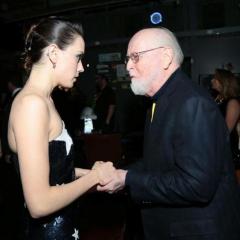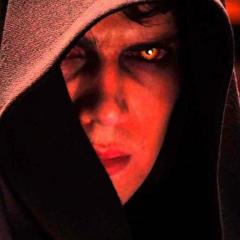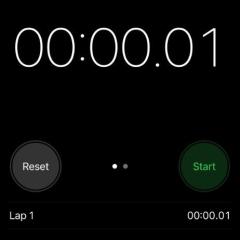-
Posts
964 -
Joined
-
Last visited
-
Days Won
1
Score last won the day on March 15 2020
Score had the most liked content!
Recent Profile Visitors
12,297 profile views
-
 bollemanneke reacted to a post in a topic:
Harry Potter - The John Williams Soundtrack Collection 7CD boxset from La-La Land Records (2018)
bollemanneke reacted to a post in a topic:
Harry Potter - The John Williams Soundtrack Collection 7CD boxset from La-La Land Records (2018)
-
 Score reacted to a post in a topic:
Theme from ”Schindler’s List” (1993), arranged for piano/cello/violin trio by John Williams
Score reacted to a post in a topic:
Theme from ”Schindler’s List” (1993), arranged for piano/cello/violin trio by John Williams
-
 TolkienSS reacted to a post in a topic:
Are There Any Film Composers Working Who Can’t Read/Write Music?
TolkienSS reacted to a post in a topic:
Are There Any Film Composers Working Who Can’t Read/Write Music?
-
 JTN reacted to a post in a topic:
Are There Any Film Composers Working Who Can’t Read/Write Music?
JTN reacted to a post in a topic:
Are There Any Film Composers Working Who Can’t Read/Write Music?
-
 Score reacted to a post in a topic:
Theme from ”Schindler’s List” (1993), arranged for piano/cello/violin trio by John Williams
Score reacted to a post in a topic:
Theme from ”Schindler’s List” (1993), arranged for piano/cello/violin trio by John Williams
-
 Score reacted to a post in a topic:
Theme from ”Schindler’s List” (1993), arranged for piano/cello/violin trio by John Williams
Score reacted to a post in a topic:
Theme from ”Schindler’s List” (1993), arranged for piano/cello/violin trio by John Williams
-

Are There Any Film Composers Working Who Can’t Read/Write Music?
Score replied to Mr. Gitz's topic in General Discussion
I think it would be better to define what it means to "read music". I can see at least three possible definitions, corresponding to different levels of musical training (and I'm just thinking about "reading", not "writing" or "playing from a score"). 1) Being able to identify the name of a note while reading a single staff in G clef. This is a basic ability that in some countries is taught in ordinary schools, and I will never believe that any serious professional musician is unable to do this, even if they say so themselves. 2) Being able to read written music on a single staff (say, a melody) and simultaneously imagining how the melody sounds, at least in terms of relative heights of the notes; possibly, being able to sing a previously unknown melody while reading it for the first time. This is a slightly more advanced ability, which requires a few years of musical training, and dedicated practice. Where I live, in the context of a formal musical education path, you are typically required to display such ability within the second year, and you must give an exam where said ability is tested (along with others) at the end of the third year. I can well imagine that the Beatles might not be able to do this, but I find it difficult to believe that people like Zimmer, Elfman etc. - who, after all, often deal with written music and musicians who play their compositions - cannot do it. 3) Being able to read a full multi-instrumental score (many staves aligned vertically, corresponding to different instruments playing simultaneously) of moderate complexity and simultaneously imagine how it sounds, at least in relative terms. This requires several years of training and practice specifically oriented to achieve this goal; it is the bread and butter of orchestra conductors, of those composers who write everything by themselves, and of orchestrators. So, John Williams, Jerry Goldsmith, Ennio Morricone, Bernard Herrmann etc. etc. etc. are/were able to do it; people like Zimmer and Vangelis most likely not. I have to disagree with this. Most of the music that most of us love would not exist without music theory; including that of John Williams. Of course, music theory evolved in time, and today's theory is different, say, from that of Mozart's times. -
I literally agree, since I'll watch the movie only if he scores it.
-
 Score reacted to a post in a topic:
Will JW score the Rey Skywalker movie?
Score reacted to a post in a topic:
Will JW score the Rey Skywalker movie?
-
 Score reacted to a post in a topic:
Will JW score the Rey Skywalker movie?
Score reacted to a post in a topic:
Will JW score the Rey Skywalker movie?
-
 karelm reacted to a post in a topic:
The Classical Music Recommendation Thread
karelm reacted to a post in a topic:
The Classical Music Recommendation Thread
-
Besides Puccini and Verdi roles, Pavarotti also left unforgettable interpretations of Mascagni's "Cavalleria Rusticana" and Leoncavallo's "Pagliacci", the two works that, together with Puccini's operas, are the most widely recognized masterpieces of the "Verismo" movement. The core of "Pagliacci" is this desperate aria, which Pavarotti impersonates perfectly: Here is a small curiosity, since we are among film music fans: I don't know if it is widely known outside Italy or not, but many years ago Pavarotti had a collaboration also with Michael Kamen (in addition to the well known one with John Williams on "Yes, Giorgio"). Pavarotti was invited by Zucchero (a famous pop/blues singer) to duet with him on his song "Miserere", and Michael Kamen wrote the orchestral arrangement. Here is a performance with all of them, including Kamen conducting the orchestra: I think it's a nice piece (the arrangement is superb as well).
-
 Score reacted to a post in a topic:
The Classical Music Recommendation Thread
Score reacted to a post in a topic:
The Classical Music Recommendation Thread
-
 Score reacted to a post in a topic:
The Classical Music Recommendation Thread
Score reacted to a post in a topic:
The Classical Music Recommendation Thread
-
That looks like a great setup of singers, and Mehta is a great conductor (several operas in the Sony box are conducted by him, by the way). I guess that, in general, any recording of Puccini or Verdi that involves Pavarotti should be recommendable!
-
 Score reacted to a post in a topic:
The Classical Music Recommendation Thread
Score reacted to a post in a topic:
The Classical Music Recommendation Thread
-
Definitely. The good thing with Puccini, in extreme synthesis, is that he managed to combine what's great in Verdi and what's great in Wagner, also incorporating more modern tendencies proper of the first two decades of the 20th century. For example, he and Stravinsky influenced each other in both directions, and it shows up in Turandot. My problem (and not only mine) with that opera is the ending of the story, which may be considered to be "morally unsatisfactory". Liu sacrifices herself for love to save Calaf's life, there is a dramatic moment of general mourning (the last, beautiful piece completed by Puccini before dying) and just a few minutes later, Calaf and Turandot declare their mutual love as if Liu's death meant nothing to Calaf, and the chorus ends up singing: "O Sun, o Life, o Eternity! Love shines over the world! Our infinite happiness laughs and sings in the Sun! Glory, glory glory!" on a fully triumphant setting of the "Nessun dorma" music. I'm quite sure that Puccini would have tried to change the libretto for the last scene, if he had lived, and he would have written a different music! @Schilkeman was asking for recommendations on the best recordings, though, and I'm not an expert on that. I have Sony's complete Puccini box set, plus a couple of individual recordings of Turandot and Tosca, and I'm very happy with all of them, but I never bought other versions to compare performances.
-
Check out the last movement, "In Paradisum", from Duruflé's Requiem. It exists in several different (original) orchestrations, the full orchestral one is here: The movement I'm referring to starts at 37:00. I'll not tell you how it ends before you've listened to it You can start with Turandot and Tosca, and then listen to all the rest! From the musical point of view, Turandot is the most advanced of his whole production - it was also his last opera, sadly unfinished. Tosca has a more consistent storyline, though (and excellent music anyway).
-
Maybe not! The CD track is actually edited and is a bit different from what the score dictates. The first bar is completely edited out, and the written score has there a loud trumpet combination that is a red herring, because you look for it and don't find it in the recording. Props to @Falstaft for identifying it despite this. And by the way, what a piece! I hadn't listened to it in a while.
-

Jerry Goldsmith's MACARTHUR (1977) - NEW! 2023 Intrada 2-CD
Score replied to Jay's topic in General Discussion
"We will return", referencing "I shall return" from MacArthur's speech. More than subtle, I'd say impossible! -

Label Threads The Official Quartet Records Thread
Score replied to Ollie's topic in General Discussion
In addition to "Romeo and Juliet", a great one, I also suggest "Il Gattopardo" ("The Leopard"). Very late-1800-esque, so much that at points it could be mistaken for something written by Tchaikovsky or Verdi (besides the one dance piece that was actually written by Verdi). Several very beautiful themes, and 3 or 4 nice setpieces. -
My favourite performance is probably the one led by Abbado with the Lucerne Festival Orchestra (it's also on youtube). Perfect tempi, perfect feeling, perfect playing. They really get all the details right. But of course, also Bernstein's recordings of Mahler's symphonies are very important ones. ... speaking of which, listen to this anecdote from Mauceri, in case you haven't heard it yet (from 1:09:45 to 1:10:56). It's relevant to Bernstein, Mahler, film music...
-
Mmm... this is a tough one. The beginning of Schindler's List...?
-

Who’s the greatest LIVING European film composer?
Score replied to Thor's topic in General Discussion
Interesting thread, @Thor ! For the greatest Italian living film composer, I would suggest to consider Franco Piersanti. Since Dimitri wrote 36 film scores (against, e.g., 22 by Korngold, or 18 by Khachaturian), I would argue that he should be counted!








